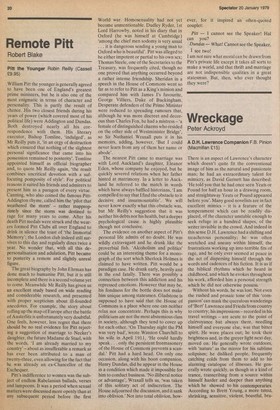Remote Pitt
Robert Blake
Pitt the Younger Robin Reilly (Cassell £9.95) William Pitt the younger is generally agreed to have been one of England's greatest prime ministers, but he is also one of the most enigmatic in terms of character and personality. This is partly the result of chance. .His two closest friends during his years of power (which covered most of his political life) were Addington and Dundas. Both destroyed nearly all his correspondence with them. His literary executor, Bishop Tomline, indulged', as Mr Reilly puts it, In an orgy of destruction which ensured that nothing of the slightest personal significance that came into his possession remained to posterity'. Tomline appointed himself as official biographer and, to quote Mr Reilly again, `the result combines uncritical devotion with a suffocating pomposity of style'. For political reasons it suited his friends and admirers to present him as a paragon of every virtue. Canning, who also coined the famous PittAddington rhyme, called him the 'pilot that weathered the storm' – rather inappropriately since the storm was destined to rage for many years to come. After his death Pitt medals were struck and the wearers formed Pitt Clubs all over England to drink in silence the toast of 'the Immortal Memory'; the London club indeed still survives to this day and regularly dines twice a year. No wonder that, with all this depersonalisation and adulation, Pitt became to posterity a remote and slightly unreal figure.
The great biography by John Ehrman has done much to humanise Pitt, but it is still incomplete and there is a second volume yet to come. Meanwhile Mr Reilly has given us an excellent study based on wide reading and considerable research, and presented with proper scepticism about ill-founded anecdotes. For example, the story about rolling up the map of Europe after the battle of Austerlitz is unfortunately very doubtful. One feels, however, less regret that there should be no real evidence for Pitt rejecting a suggestion of marriage to Necker's daughter, the future Madame de Stael, with the words, `I am already married to my country' – about as insufferable a remark as has ever been attributed to a man of twenty-three, even allowing for the fact that he was already an ex-Chancellor of the Exchequer.
Pitt's indifference to women was the subject of endless Rabelaisian ballads, verses and lampoons. It was a period when sexual matters were discussed more openly than at any subsequent period before the first World war. Homosexuality had not yet become unmentionable. Dudley Ryder, 1st Lord Harrowby, noted in his diary that in Oxford (he was himself at Cambridge) `among the chief men sodomy is very usual . . . it is dangerous sending a young man to Oxford who is beautiful'. Pitt was alleged to be either impotent or partial to his own sex; Thomas Steele, one of the Secretaries to the Treasury, was frequently cited, though no one proved that anything occurred beyond a rather intense friendship. Sheridan in a speech in the House of Commons went so far as to refer to Pitt as a King's minion and compared him with James I's favourite, George Villiers, Duke of Buckingham. Desperate defenders of the Prime Minister were reduced to spreading rumours that, although he was more discreet and decorous than Charles Fox, he had a mistress – female of distinguished charms who resided on the other side of Westminister Bridge', so Sir Nathaniel Wraxall puts it in his memoirs, adding, however, `But I could never learn from any of them her name or abode'.
The nearest Pitt came to marriage was with Lord Auckland's daughter, Eleanor Eden, whose company he enjoyed, but he quickly severed relations when her father hinted at matrimony. In a letter to Auckland he referred to the match in words which have always baffled historians, `I am compelled to say that I find the obstacle to it decisive and insurmountable'. We will never know exactly what this obstacle was, but Mr Reilly's suggestion that it was neither his debts nor his health, but a deeper psychological cause is highly plausible though not conclusive.
The evidence on another aspect of Pitt's personal life admits of no doubt. He was wildly extravagant and he drank like the proverbial fish. `Alcoholism and politics' could be an interesting theme for a monograph of the sort which Sherlock Holmes is claimed to have written. Pitt would be a paradigm case. He drank early, heavily and in the end fatally. There was possibly a connection between this addiction and his repressed emotions. However that may be, his fondness for the bottle does not make him unique among statesmen. Gladstone is supposed to have said that the House of Commons is a place where one can neither relax nor concentrate. Perhaps this is why politicians are not the most abstemious class in society, although they tend to cover up for each other. `On Thursday night the PM was very bad', wrote Winston Churchill to his wife in April 1911, 'He could hardly speak . . . only the persistent freemasonery of the House of Commons prevents a scandal.' Pitt had a hard head. On only one occasion, along with his boon companion, Henry Dundas, did he appear in the House in a condition which made it impossible for him to conduct business. 'No illiberal notice or advantage', Wraxall tells us, 'was taken of this solitary act of indiscretion. The House adjourned the discussion, and it sank into oblivion.' Not into total oblivion, how ever, for it inspired an often-quoted couplet: Pitt — I cannot see the Speaker! Hal can you?
Dundas — What! Cannot see the Speaker, I see two!
I am not sure what moral can be drawn from Pitt's private life except it takes all sorts to make a world, and that thrift and marriage are not indispensible qualities in a great statesman. But, then, who ever thought they were?


































 Previous page
Previous page